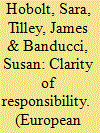| Srl | Item |
| 1 |
ID:
120136


|
|
|
|
|
| Publication |
2013.
|
| Summary/Abstract |
Recent literature has shown that the long established link between economic performance and electoral outcomes is conditioned by a country's institutions and government, what is often termed 'clarity of responsibility'. In this article two distinct dimensions of the clarity of the political context are identified: institutional and government clarity. The first captures the formal dispersion of government power, both horizontally and vertically. The second captures the cohesion of the incumbent government. Analysing survey data from 27 European countries, it is shown that voters' ability to hold governments to account, for both the economy and management of public services, is primarily influenced by the extent to which there is an identifiable and cohesive incumbent, whereas formal institutional rules have no direct impact on performance voting.
|
|
|
|
|
|
|
|
|
|
|
|
|
|
|
|
| 2 |
ID:
081933


|
|
|
|
|
| Publication |
2008.
|
| Summary/Abstract |
This study presents an analysis of how the media reported the 2007 elections in Turkey. Past research on election campaign media coverage, particularly newspapers, suggests that the media can play an important role in informing voters. However, much of the research on campaign media coverage has focused on Western democracies with little attention paid to how features of the media system such as press regulations, ownership structures, journalistic practices, and partisan alignment in the press can both shape how election news is reported and its possible influence on voting decisions. In order to expand understanding of campaign media coverage outside Western democracies, this study examines how four Turkish newspapers covered parties and issues during the 10 weeks prior to the July 2007 elections
|
|
|
|
|
|
|
|
|
|
|
|
|
|
|
|